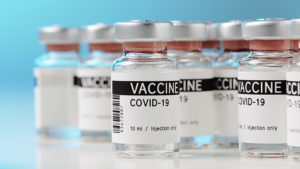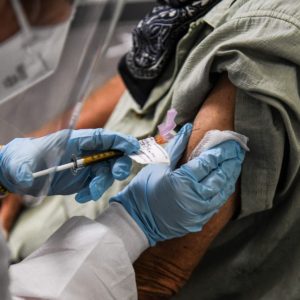Don’t Wait Around For A Vaccine
We are almost a year into the pandemic and our scientific community has accomplished something no one thought could be done. Vaccines that are up to 95% effective are already being injected into the arms of over 1 million Americans each day.
We have to recognize this as a miracle of modern science, but we also need to understand that vaccines are not 100% effective for everyone. The U.S. Food and Drug Administration said that it will approve any SARS-COV-2 vaccine that prevents COVID-19 in at least 50% of those who receive it (50% efficacy), a relatively low bar.

Initial reports suggest that the Pfizer BioNTech and Moderna vaccines are 95% efficacious, which is extremely impressive considering the timeline for vaccine development. However, the AstraZenica vaccine is less efficacious, with only 62% efficacy with those given two full doses and 90% in those given a half dose followed by one full dose.
It’s important, however, to understand that the effectiveness of a vaccine depends not only on the vaccine, but also on the health and characteristics of the person being vaccinated.
Ohio State University researchers reviewed 49 vaccine studies conducted with humans over the past 30 years. They found that stress, depression, loneliness, and poor health can negatively affect the body’s immune response to vaccination.
The researchers found that impaired immune responses from vaccines tended to fall into three categories:
- interference with the development of antibodies.
- more rapid erosion of antibody protection.
- intensification of vaccination’s side effects.
The constant stress of living in a pandemic with our disrupted routines and social lives has set us back when it comes to maintaining healthy behaviors. People all over the world are suffering from higher levels of depression and anxiety symptoms. Many of us are sleeping less. Online sales of alcohol have increased 262% from 2019. More of us are binge eating and gaining weight. Calls to the National Eating Disorders Hotline are up 80% this year. And Fitbits are recording fewer average step counts. Any one of these health changes can negatively impact the effectiveness of a vaccine, but most Americans have been affected by more than one or maybe even all.
 The bottom line is stress impairs health in many ways, the most prominent is a compromised immune response, which can occur with or without a vaccine.
The bottom line is stress impairs health in many ways, the most prominent is a compromised immune response, which can occur with or without a vaccine.
A study concerned with vaccine response in older adults found the effectiveness of the influenza vaccine to be reduced by as much as 50% in those who were serving as caregivers for a spouse with dementia. Caregiving, especially for those with dementia, is a chronic stressor, often leading to a reduced social network, disengagement from hobbies, and increased risk for anxiety and depressive disorders.
Another study investigated the effectiveness of the pneumonia vaccine in older adults who were serving as caregivers for their adult children with developmental disabilities. This study found that after three to six months, caregiving stress ultimately eroded the initial antibody response. Both of these studies indicate that psychological stress similar to that experienced by caregivers can significantly compromise the effectiveness of a vaccine.
Like stress, loneliness can impair immune function, even altering young and healthy people’s vaccine response. A study of college undergraduate students found that those who had a smaller social network had lower antibody levels four months after their first influenza vaccine. Similar studies have found that those who are lonely feel more overwhelmed and stressed, which contributes to weaker antibody responses. Social distancing and staying at home have definitely increased loneliness in many Americans in the past few months.
We also know from past blog posts that obesity can reduce the effectiveness of a vaccine by as much as 50%, and getting as little as four hours of sleep for just one night can reduce immune response by as much as 70%.
 The good news is we all have the ability to make improvements to our health that will give us the best possible response to a coronavirus vaccine. Managing stress through exercise or mindfulness, changing your eating habits, and getting enough sleep—even in the short term right around the time of vaccination—could improve how your body responds.
The good news is we all have the ability to make improvements to our health that will give us the best possible response to a coronavirus vaccine. Managing stress through exercise or mindfulness, changing your eating habits, and getting enough sleep—even in the short term right around the time of vaccination—could improve how your body responds.
Just sitting around waiting for a vaccine to help you get your life back is not what you should be doing. It’s more important now than any other time in your life for you to take your health and well-being seriously. There’s plenty of evidence to show that a vaccine just might not work for you if you are stressed, lonely, obese or not getting enough sleep.
One of the best things you can do to start preparing your body for a vaccine is strength train once a week. You will be stronger, less stressed, and your immune system will improve before and after you get a vaccine.
Our Simple 9 nutritional program will help you with all the other healthy habits you can adapt to improve the effectiveness of a vaccine. Our program will even coach you on effective ways to reduce stress.
We are here for you, even on this last leg of the pandemic. If you aren’t getting in to see us for your 20 Minutes A Week and engaging with one of our amazing coaches, please consider doing it now. Don’t just sit around waiting for a vaccine. Get your body ready for a vaccine.
Stay Strong,
Bo Railey

